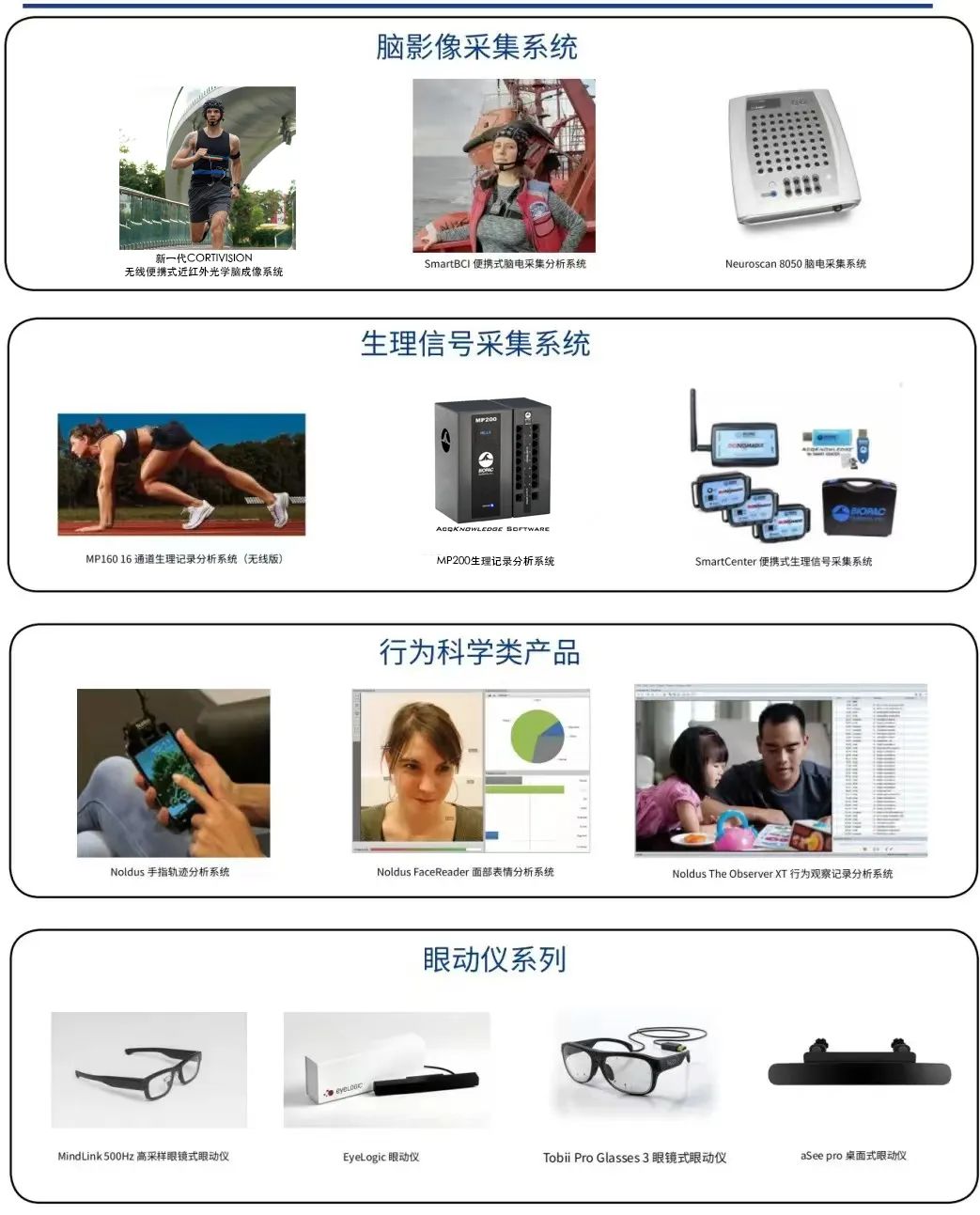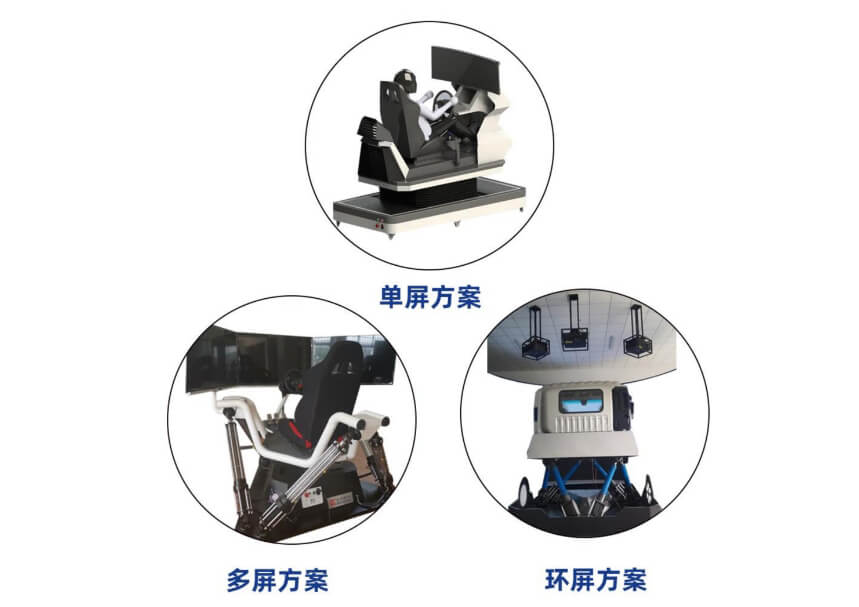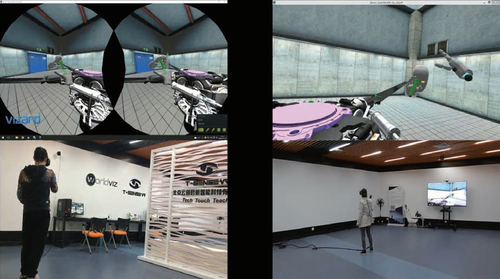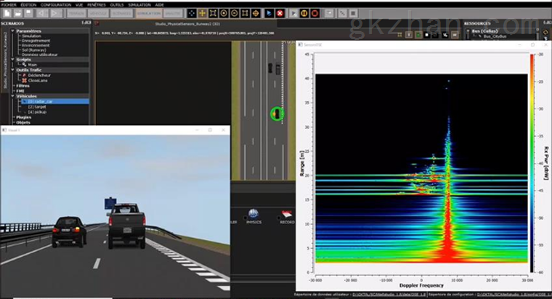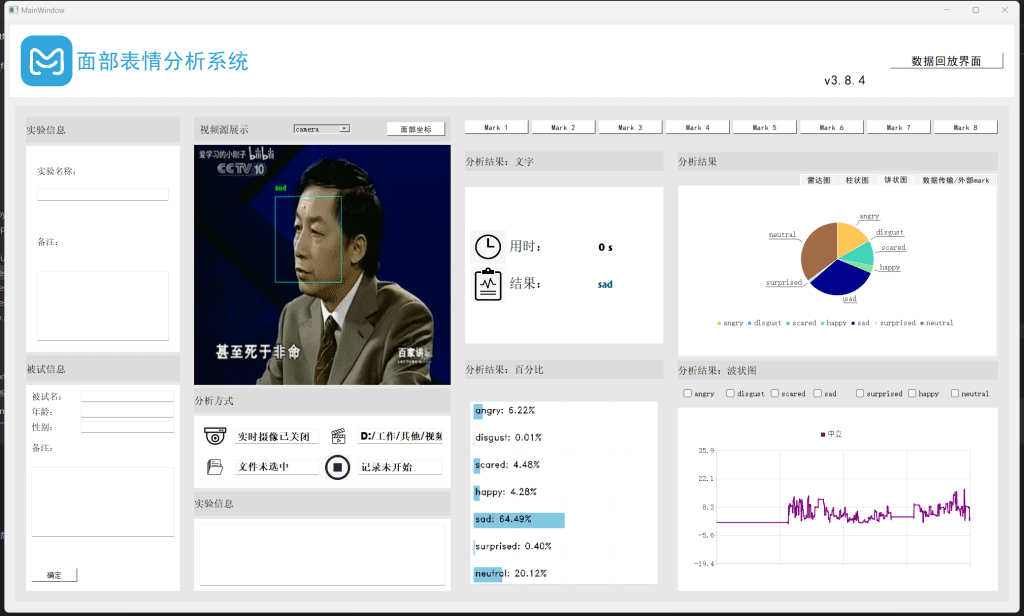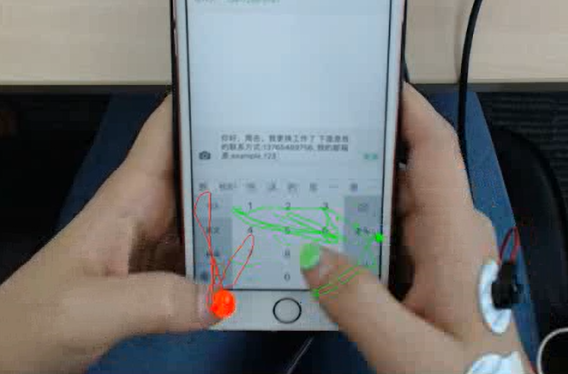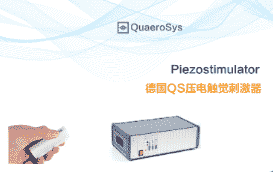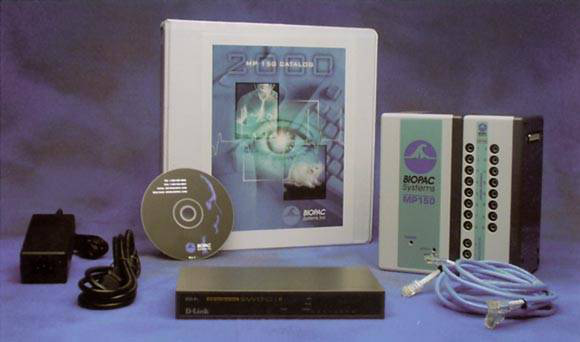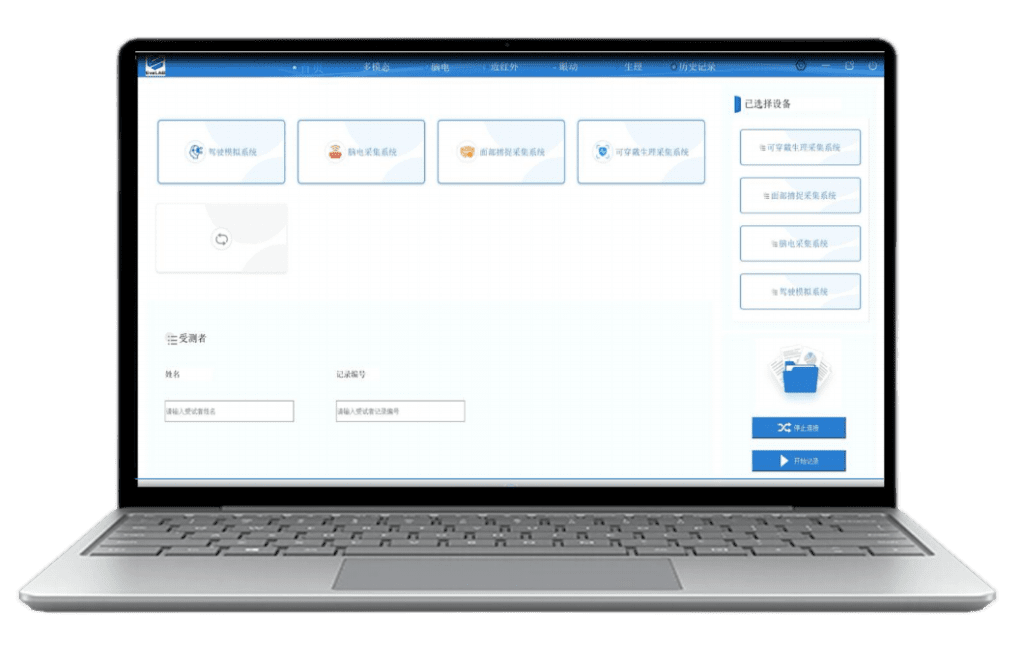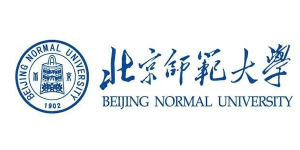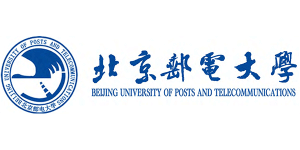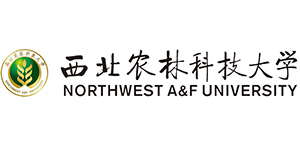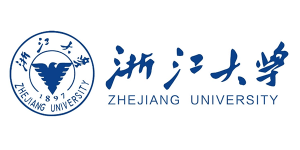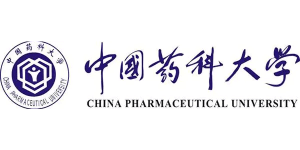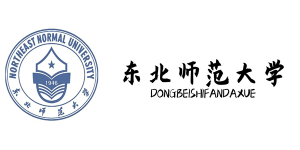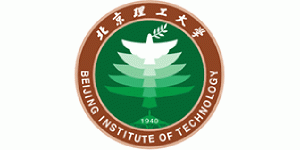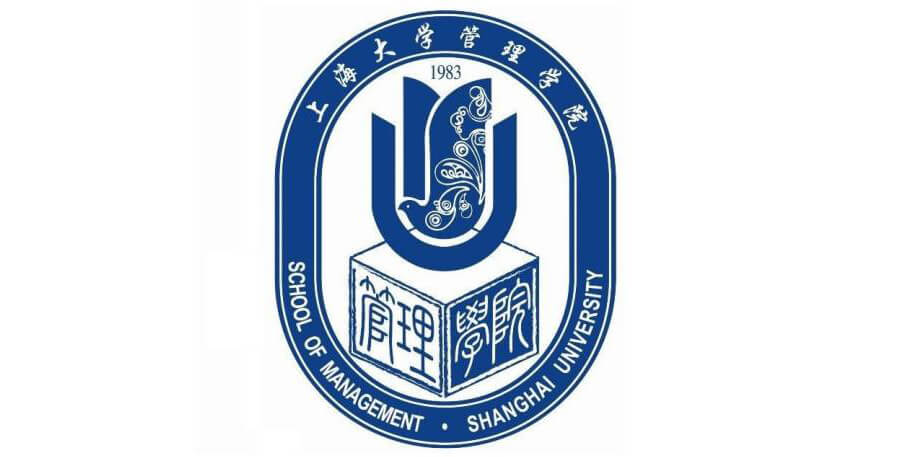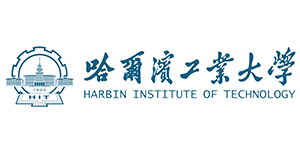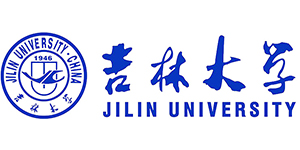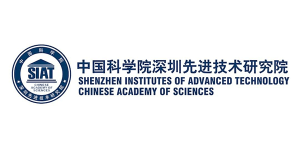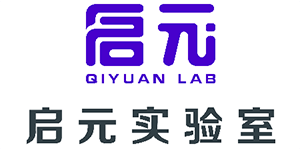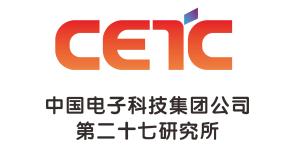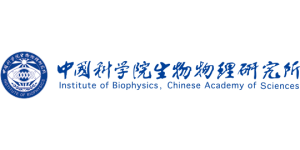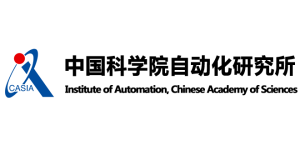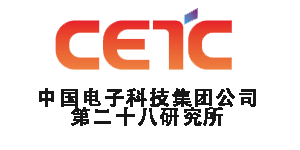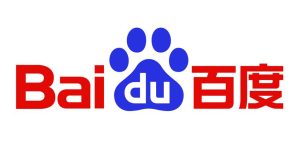



On May 10th, the 2nd National University Digital Economy Education Development Forum was held at Xiamen University. The forum was organized by the National Digital Economy Graduate Education Steering Committee (hereinafter referred to as the National Digital Economy Education Steering Committee), and hosted by the School of Economics of Xiamen University, the Wang Yannan Institute of Economic Research, and the Zou Zhizhuang Institute of Economic Research. The forum focused on the theme of "Cultivation of Digital Economy Talents under the Goal of Educating a Strong Country: Digitalization Transformation and Deep Integration of Industry and Education", and attracted more than 210 guests from nearly 120 universities and research institutes across the country to attend the meeting. The forum is one of the series of academic activities for the 20th anniversary of the establishment of Wang Yannan Institute of Science and Economics (WISE) of Xiamen University.




Opening Ceremony






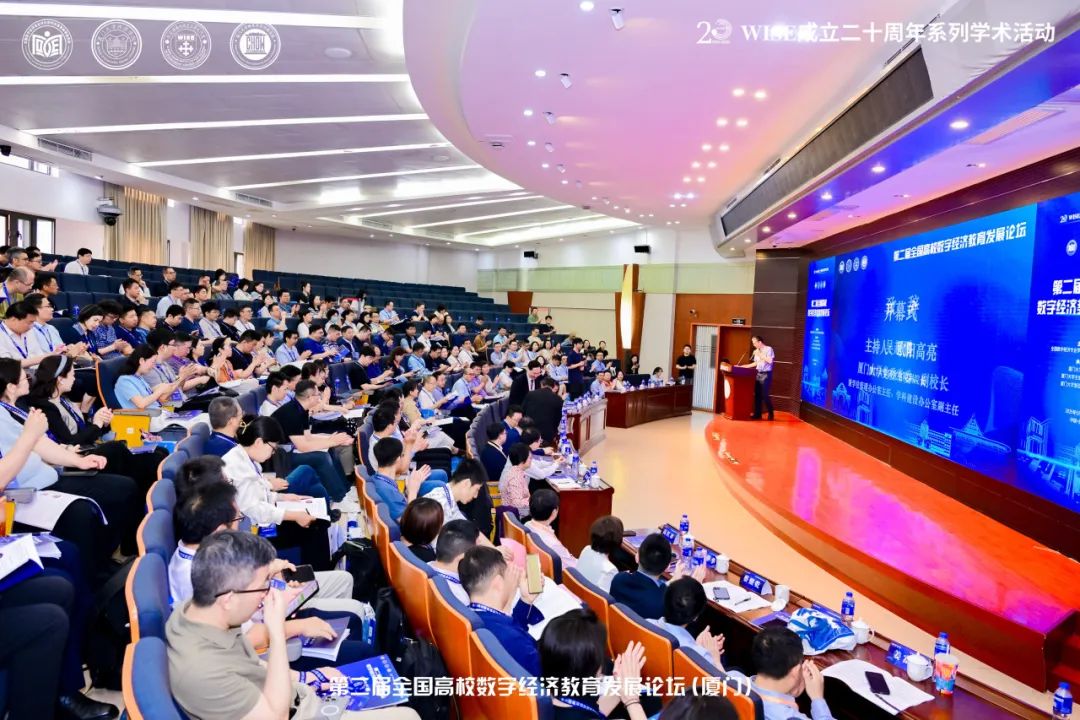


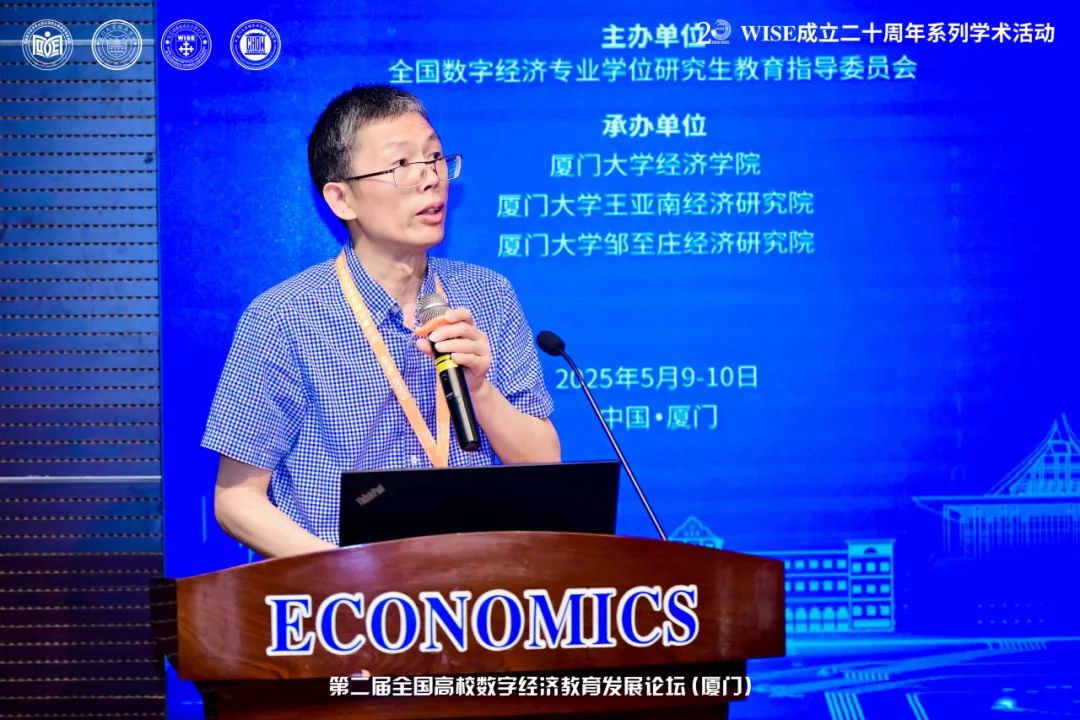


On the morning of the 10th, the opening ceremony of the forum was held in the lecture hall of the Economics Building of Xiamen University. Wu Chaopeng, Standing Committee of the Party Committee and Vice President of Xiamen University, and Liu Shouying, Secretary General of the National Digital Economy Teaching Guideline Committee and Professor of the School of Economics of Renmin University of China, delivered speeches. The opening ceremony was hosted by Ouyang Gaoliang, Deputy Dean of Xiamen University Graduate School, Director of Degree Management Office and Deputy Director of Discipline Construction Office.
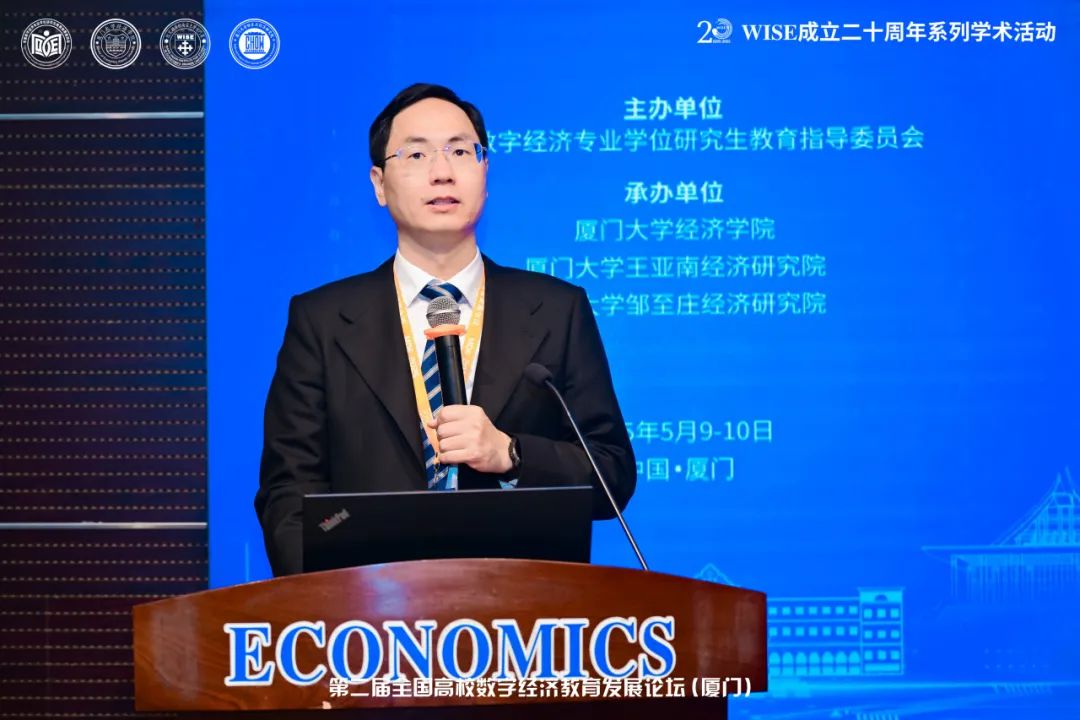


Wu Chaopeng said in his speech that the digital economy has become the core engine of the country's high-quality development, and university education and research workers should take the initiative to dock the national strategic needs and explore new paths for talent training and discipline construction. Xiamen University has actively constructed an interdisciplinary curriculum system to promote the construction of digital economy and related courses and majors in a cross-disciplinary mode. Last year, Xiamen University was approved as a master's degree authorization point in digital economy, relying on the platform of Zou Zhizhuang Economic Research Institute and the School of Economics, to build a trinity of talent training system of theoretical foundation, digital analysis ability and artificial intelligence technology, and strive to create comprehensive digital economy talents with both theoretical depth and technical breadth. We look forward to the guests' insights in this meeting, and jointly contribute wisdom and strength to build a new pattern of digital economy education in the new era and promote the high-quality development of digital economy.
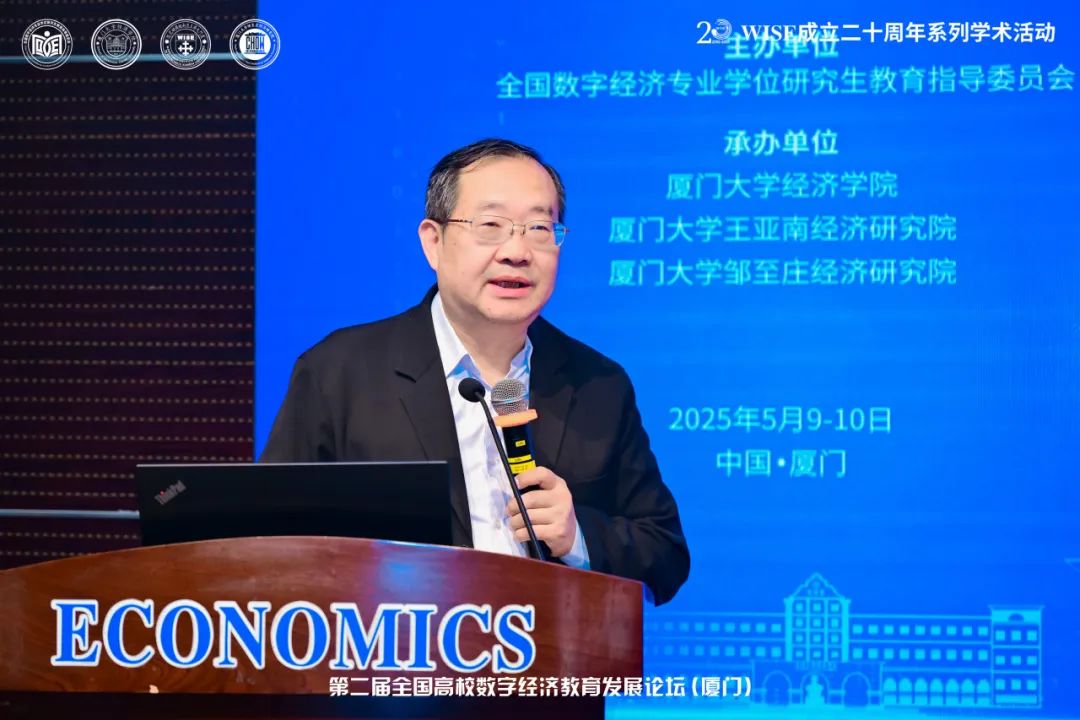


In his speech, Liu Shouying, on behalf of the National Steering Committee of Digital Economy Specialized Degree Graduate Education, welcomed all the guests and expressed his gratitude to Xiamen University's Economics Department for its hard work in hosting this Education Development Forum. He pointed out that digital economy master's degree education is facing a major mission and challenges. First of all, the mission of the MSc in Digital Economy has gone beyond the professional degree itself and involves the reform of the whole economics education. With the arrival of the era of digital civilization, the knowledge system of economics needs to be reconstructed, and the base of basic science has shifted from mathematics to data science, artificial intelligence and computers, economics, as an outlet of knowledge, needs to be reshaped into a new type of knowledge system. Secondly, there are many problems in the current digital economy master's degree education in terms of curriculum, faculty, training quality and so on. Liu Shouying conveyed the reform spirit of the Ministry of Education, pointing out that it should focus on practice orientation, and that the training of master's degree should be centered on practical exploration, and the evaluation system should be diversified and focus on practical value and application ability. He emphasized that in the future, the quality of digital economy master's degree education should be put in the first place, and the cultivation of special talents should be carried out according to local conditions. The committee will carry out the audit of degree authorization points, research on education development, prepare core teaching materials, strengthen the training of teachers, hold case competitions and other activities to promote the development of the talent cultivation system of digital economy master's degree.
keynote speech






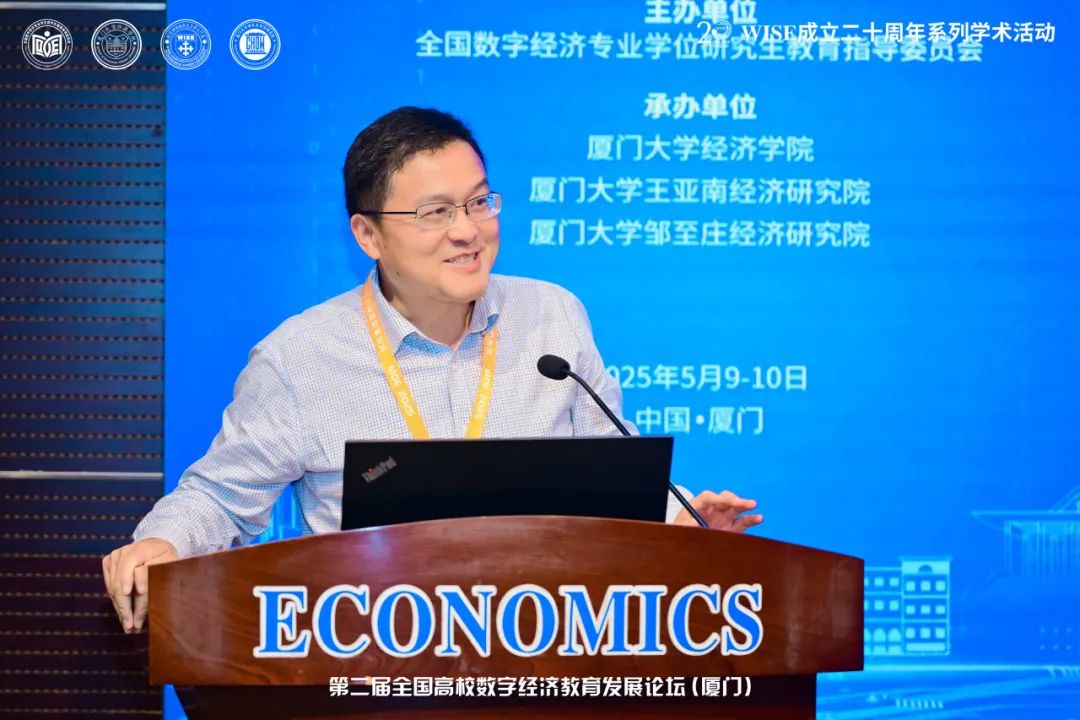


The keynote session was moderated by Li Xiaoping, a member of the National Digital Economy Teaching Guidance Committee, assistant to the president of Zhongnan University of Economics and Law and director of the Department of Science and Research.
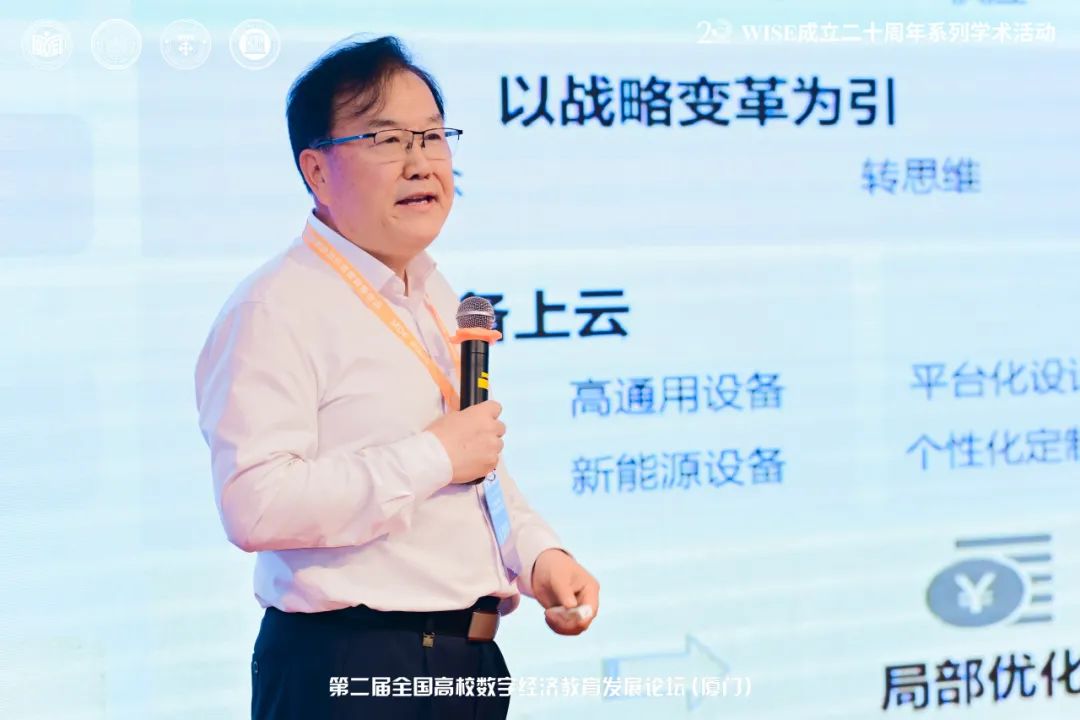


Wang Jianwei, Vice Chairman of the National Digital Economy Education and Guidance Committee, Vice President and Executive Secretary General of the China Electronic Information Industry Federation, and former first-class inspector of the Information Technology Development Department of the Ministry of Industry and Information Technology, delivered a report titled "The Practice of Digital Transformation of the Manufacturing Sector and Reflections on the Cultivation of Digital Talents". Wang Jianwei proposed to guide manufacturing enterprises to focus on the main line of "adhering to the strategy of digital transformation of the manufacturing industry and shaping new advantages in the era of digital economy", to build two types of "customer-centered and data-centered" capabilities, and to implement "strategic change as the guide and organizational change as the guide". The three major changes are guided by strategic change, based on organizational change, and taking business change as the path, focusing on the four scenarios of "taking equipment in the cloud as the breakthrough point, model innovation as the bullnose, industry application as the testing ground, and park empowerment as the main battlefield", and grasping the concept of "single-point breakthrough, local optimization, local optimization, and digital transformation". The five stages of "single-point breakthrough, local optimization, integrated application, platform support and ecological synergy" are grasped. For the training of digital talents, Wang Jianwei suggested to strengthen the cooperation between schools and enterprises, strengthen the status of the main body of the enterprise, and increase the computer class, electronic information class related teachers.
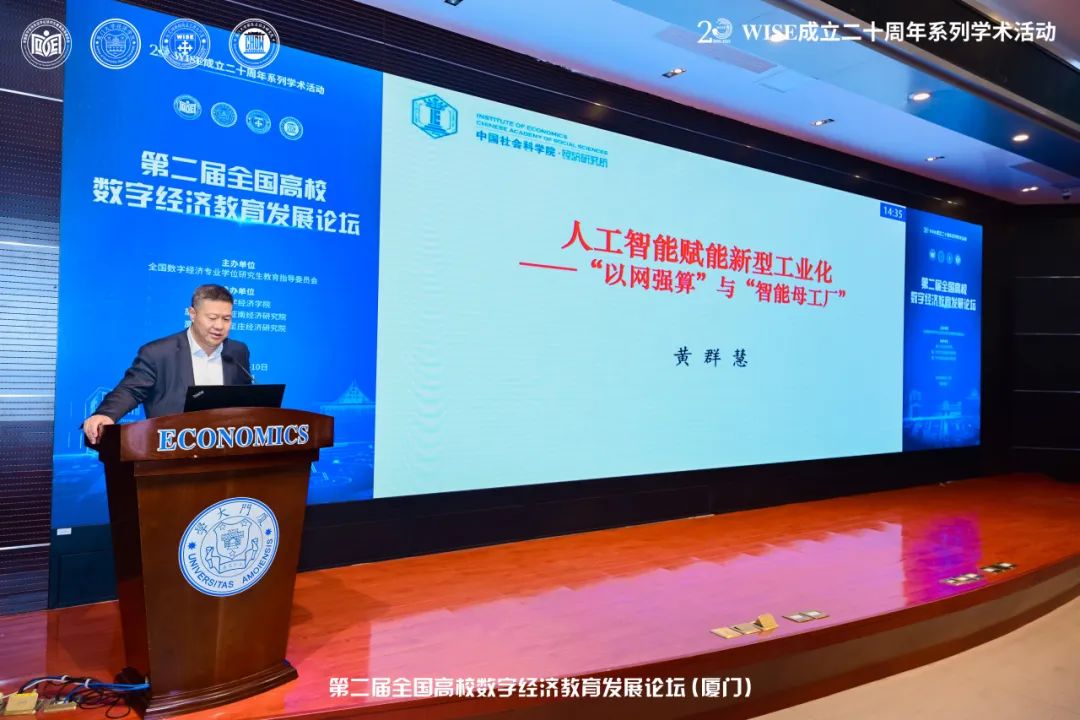


Huang Qunhui, a member of the National Digital Economy Education and Guidance Committee, a researcher at the Institute of Economics of the Chinese Academy of Social Sciences, and a special professor at the School of Economics of the University of Chinese Academy of Social Sciences, presented a report entitled "Artificial Intelligence Enables New Industrialization". Based on the new industrialization, which is the key task of Chinese modernization, Huang Qunhui put forward the viewpoints of strengthening the strategy of "Strengthening Computing with Network" and strengthening the construction of "Intelligent Mother Factory". Arithmetic power is the foundation of artificial intelligence, and Huang Qunhui suggests incorporating arithmetic power into the layout of the new quality productivity to realize the strategy of "strengthening arithmetic with network". In order to adapt to the current international situation and China's rising labor costs, Huang Qunhui advocates keeping core competitiveness technologies in the country as "intelligent mother factories" and replicating factories around the world.
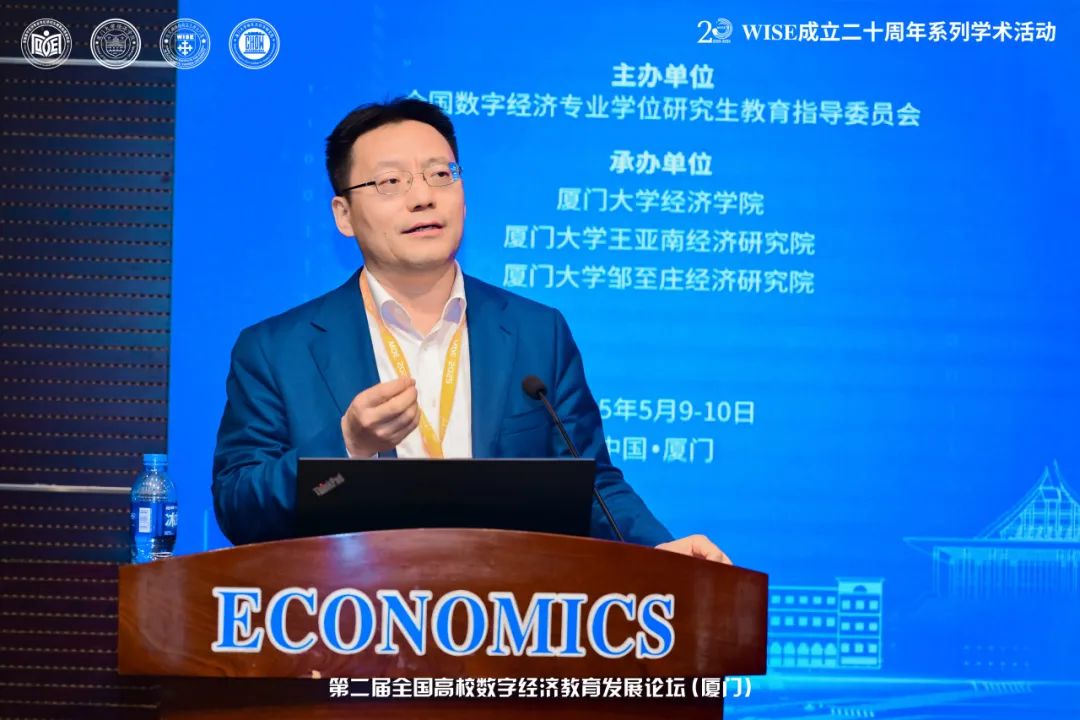


Mr. Shan Zhiguang, member of the National Digital Economy Education and Guidance Committee and Director of the Informatization and Industrial Development Department of the National Information Center, presented a report entitled "Trends and Paths of Digital Transformation". According to Shan Zhiguang, promoting digital transformation is a systematic project of reform and innovation based on the empowerment of digital technology to realize the reshaping, reconstruction, reengineering and reorganization of business processes, and it is necessary to comprehensively make use of the flow-driving effect of "Internet+", the data-driving effect of "Big Data+", and the data-driving effect of "Mobile Communication+". We should comprehensively utilize the traffic-driven effect of "Internet+", the data-driven effect of "Big Data+", the efficiency-driven effect of "Mobile Communication+", the algorithm-driven effect of "Artificial Intelligence+", and the credible-driven effect of "Blockchain+" to push forward the digital transformation to the network connection, IoT, Digital and Intelligent. Artificial intelligence is a new type of productivity in the era of digitization, and big models will profoundly change the underlying logic of future digitization development and reconstruct traditional digitization application scenarios. Blockchain is a new type of production relationship in the era of digitization, which will promote the construction of a new generation of distributed public IT systems and distributed trusted data space, and support the trusted circulation and valorization of data elements.
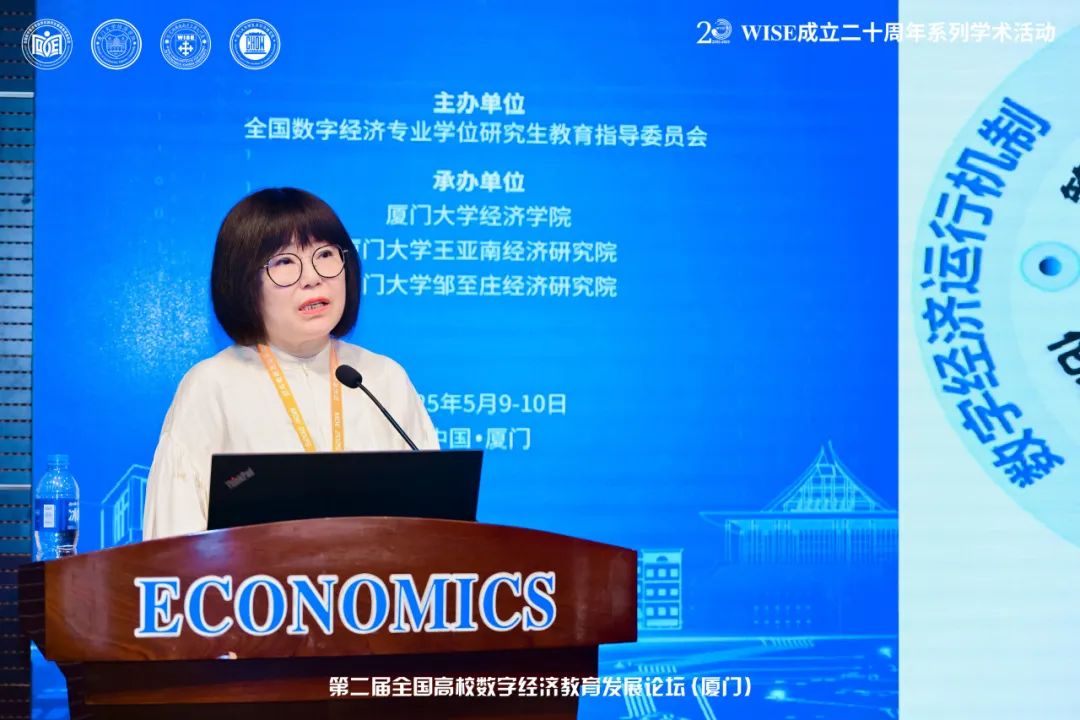


Liu Lanjuan, former member of the Standing Committee of the Party Committee and Vice President of Shanghai University of Finance and Economics (SUFE), and Director of the Digital Science and Technology Department of SUFE, gave a presentation entitled "Exploring the Path of Case Center Construction for Master's Degree Cultivation in Digital Economy". According to Liu Lanjuan, the cultivation of master's degree in digital economy should be based on economics, data science, information science, management and other disciplines, exploring the integrated teaching method of "curriculum teaching + case teaching + practical teaching", focusing on the combination of theory and practice, and highlighting the integration of industry and education. In order to solve the pain point of the "time gap" between talent training and industrial demand, Liu Lanjuan advocates the application of case teaching to promote the reform of the teaching mode of master's degree in digital economy, and the construction of a digital economy case center that is supported by policies, guaranteed by resources, and operated in a sustainable manner.
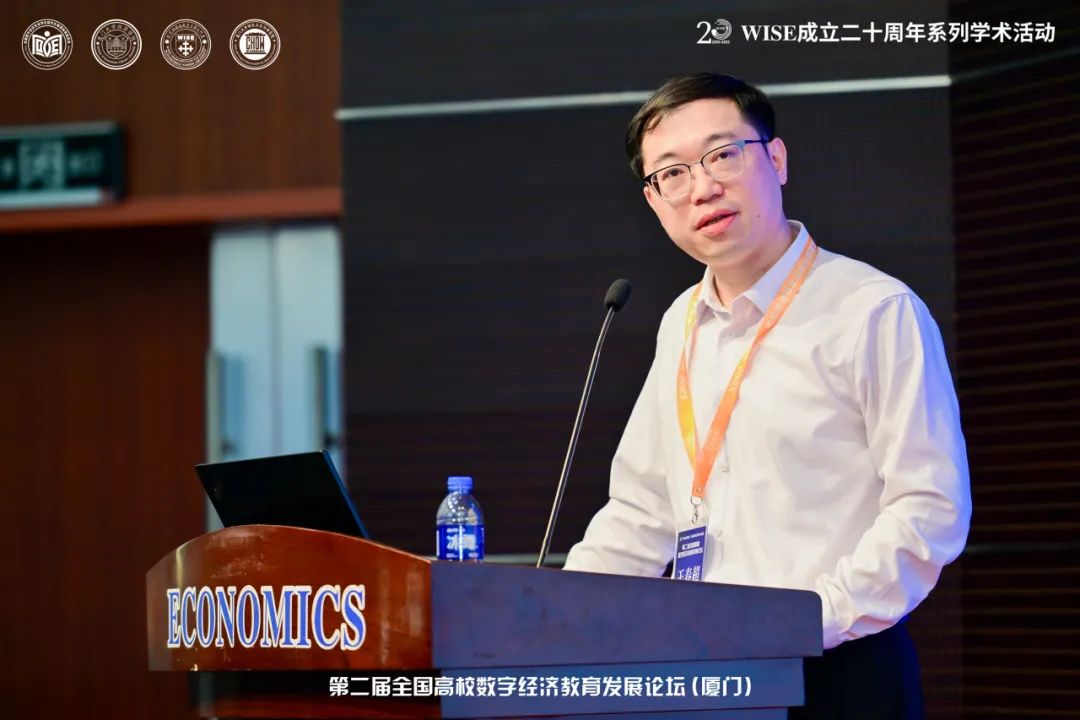


Wang Chunchao, Professor of South China Normal University, presented a report entitled "Artificial Intelligence Development and Employment Landscape Reshaping". Under the guidance of the "employment priority" strategy, Wang Chunchao explained in detail the development of artificial intelligence and the employment pattern, and found that the impact of AI on the quantity of employment in China has shifted from a positive to a negative impact, the demand for AI jobs is expanding to the west, the current gap between supply and demand for AI-related professions is large, and the inter-industry mobility of talents in the AI industry is obvious. Overall, the impact of AI on the quality of employment in China is positive, but there is a trend of negative shift, Wang Chunchao believes that China needs a clearer understanding of the direction of the development of artificial intelligence.
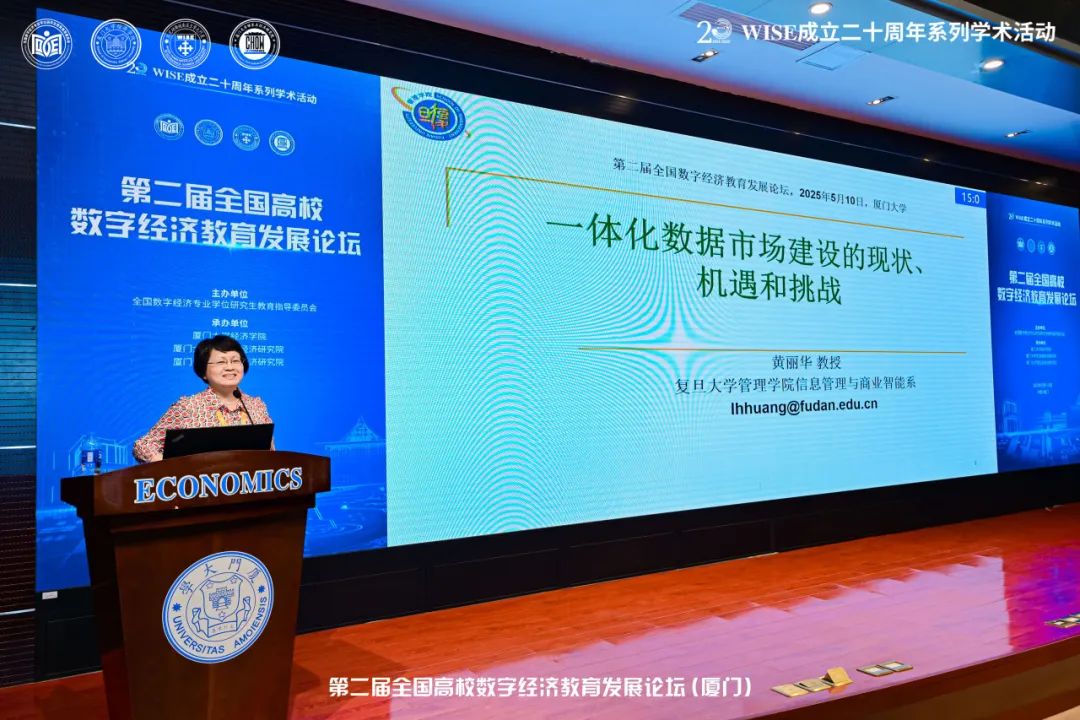


Prof. Huang Lihua from School of Management, Fudan University presented a report entitled "Status quo, opportunities and challenges of integrated data market construction". Huang Lihua believes that China's data market is currently in the initial stage, the demand side shows significant demand stratification characteristics, need to rely on institutional leadership and policy support, through the "semi-natural" evolution into the key development period. Currently, the integrated data market is facing four major challenges: insufficient knowledge, institutional barriers, lack of data market mechanism, and technical bottlenecks in market circulation. In order to solve the related problems, Huang advocates to carry out researches on basic theories, data market mechanism, economics of data property rights, and security of data circulation.
keynote speech






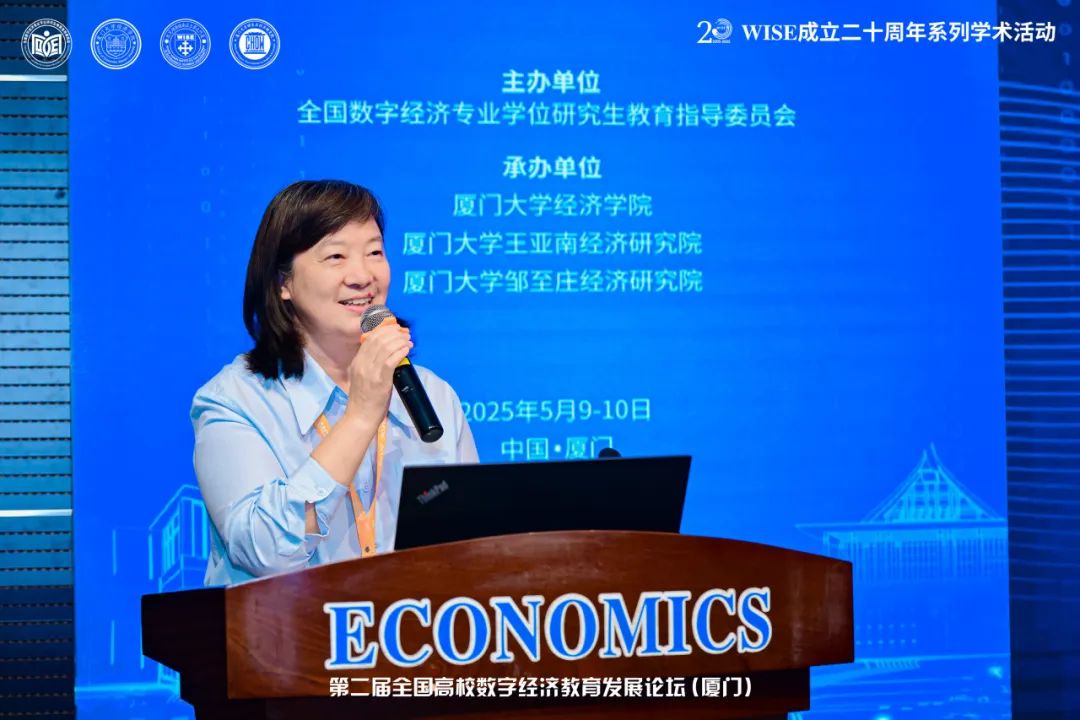


The keynote session was moderated by Yuan Jianhong, a member of the National Digital Economy Teaching Guideline Committee and a professor at the School of Economics and Management of Southeast University.
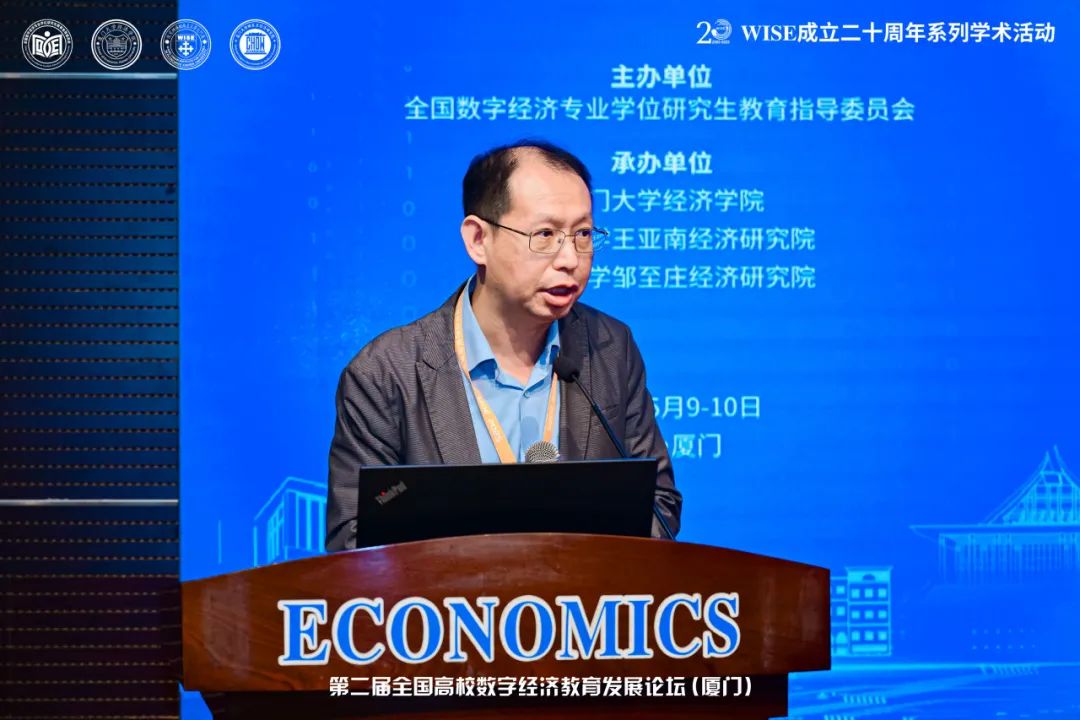


Prof. Affirmative Hao, Vice President of Guangdong University of Foreign Studies (GDUFS), in his report titled "Integration and Innovation, Fostering Talents and Promoting Trade: Guangwai's Practice and Exploration of Cultivation of Internationalized Digital Talents in the Era of Digital Economy", introduced in detail the unique cultivation paths explored by GDUFS in the cultivation of internationalized digital talents in the era of digital economy through integration of industry and education, and interdisciplinary integration. As the only university participating in the Canton Fair for 39 consecutive years in China, GDUTF, relying on the conditions and achievements of its academic disciplines, has explored the characteristic cultivation path through the integration of industry and education and interdisciplinary integration in the cultivation of internationalized digital talents in the digital economy.
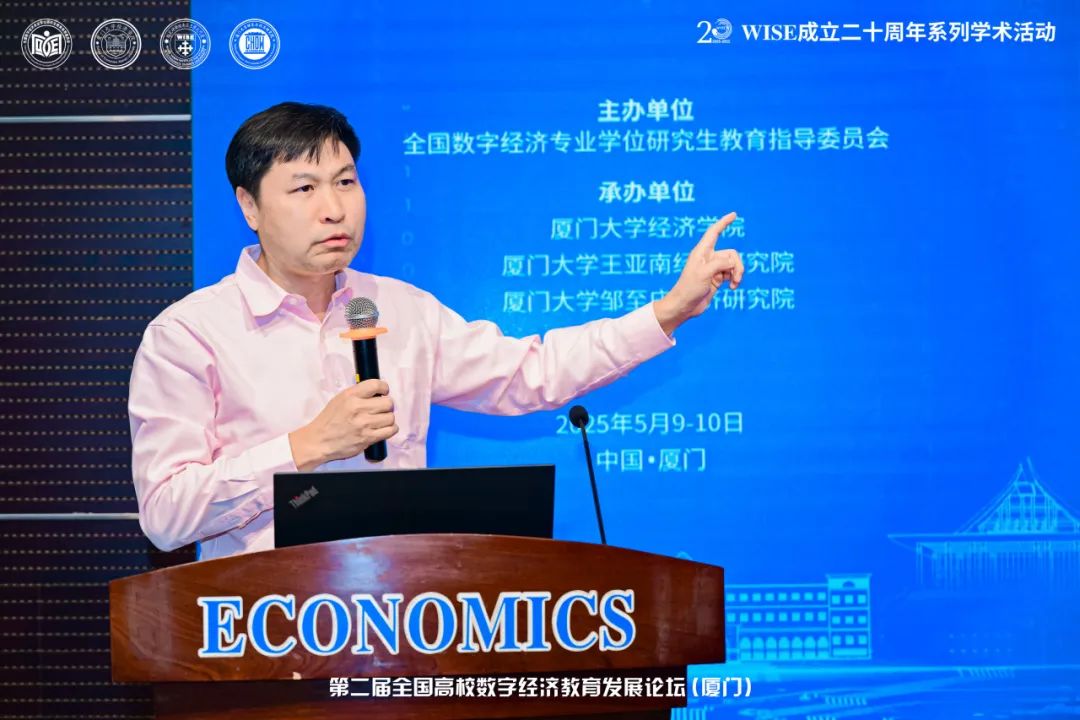


Gao Hongbing, director and professor of Digital Economy Research Institute of Shanghai University of Finance and Economics, and consultant of Alibaba Group, shared the new mode of school-enterprise cooperation for master's degree in digital economy under the "industry-teaching integration 2.0". By combing through the veins of industrial change, Gao Hongbing pointed out that in the digital economy era, industries, disciplines and technologies are subverted by the underlying logic, and the integration of industry and education is facing challenges such as the lagging curriculum system, the disconnection between university practice resources and industrial demand, and the fact that the integration of industry and education is more virtual than real, etc. He also introduced Ali's practice of integration of industry and education and proposed that we should actively build research and service platforms for integration of industry and education and form a triangular cooperation between the industry, research, and universities. It is also proposed to actively build a research and service platform for the integration of industry and education, form a triangular cooperation and empowerment relationship among industry, research and universities, deepen the reform and build a tripartite incentive mechanism, and promote the "integration of industry and education 2.0" model.
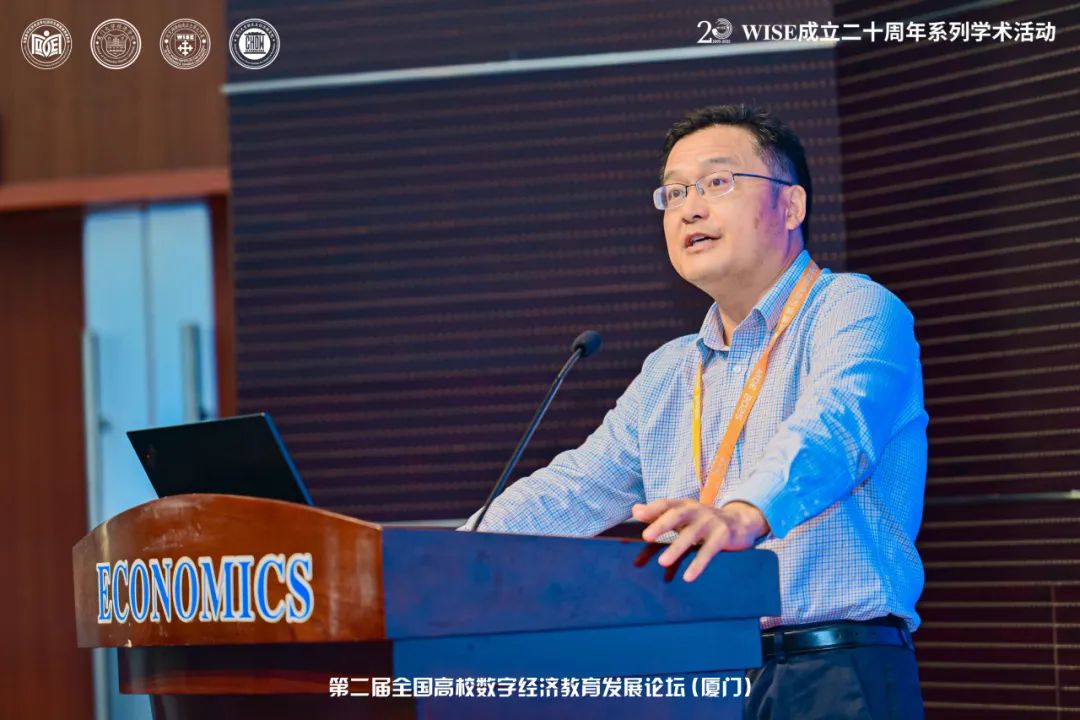


Li Xiaoping, member of the National Digital Economy Teaching Committee, assistant to the president of Zhongnan University of Economics and Law and director of the Department of Scientific Research, focused on "Artificial Intelligence and the Transformation of Teaching and Research of Economics", and put forward that the deep integration of the industry is the trend of the times and the requirements of the policy, and that the function of the university in the digital era is undergoing a profound transformation, and that teaching and research and talent cultivation are facing the necessity of transformation in the field of economics and theories. The teaching and research of economics and talent cultivation are facing the necessity of economic theory reconstruction, matching cultivation ability with industrial demand, and ecological synergy and other transformations. Li Xiaoping also discussed the transformation of the training system of economics master's degree, including the cultivation objectives, the revision of the dimensions of the target system, the transformation of the curriculum system and the strengthening of the safeguard measures, etc., and emphasized the importance of independent innovation to the cultivation of talents in digital economy.
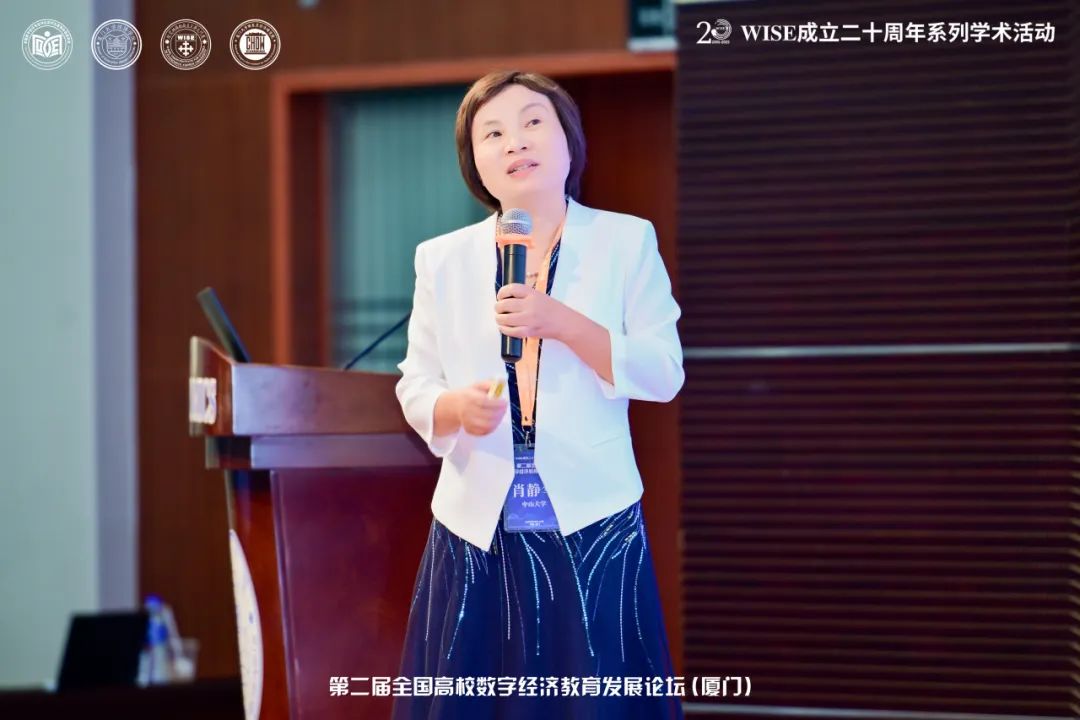


Xiao Jinghua, Professor of School of Management, Sun Yat-sen University, shared her thoughts on "Case Studies in the Digital Economy Driven by the Integration of Industry and Education". She pointed out that case studies can better recognize cutting-edge practices, summarize and refine innovations, and are suitable for digging out new phenomena in the era of digital economy, and their exploratory, practical and vivid characteristics are conducive to promoting the integration of industry-teaching-research. In addition, she introduced the trilogy of case study, including enterprise research, forming insights and writing for publication, and elaborated the key points of case study in terms of in-depth interviews, theoretical innovation and thesis writing.
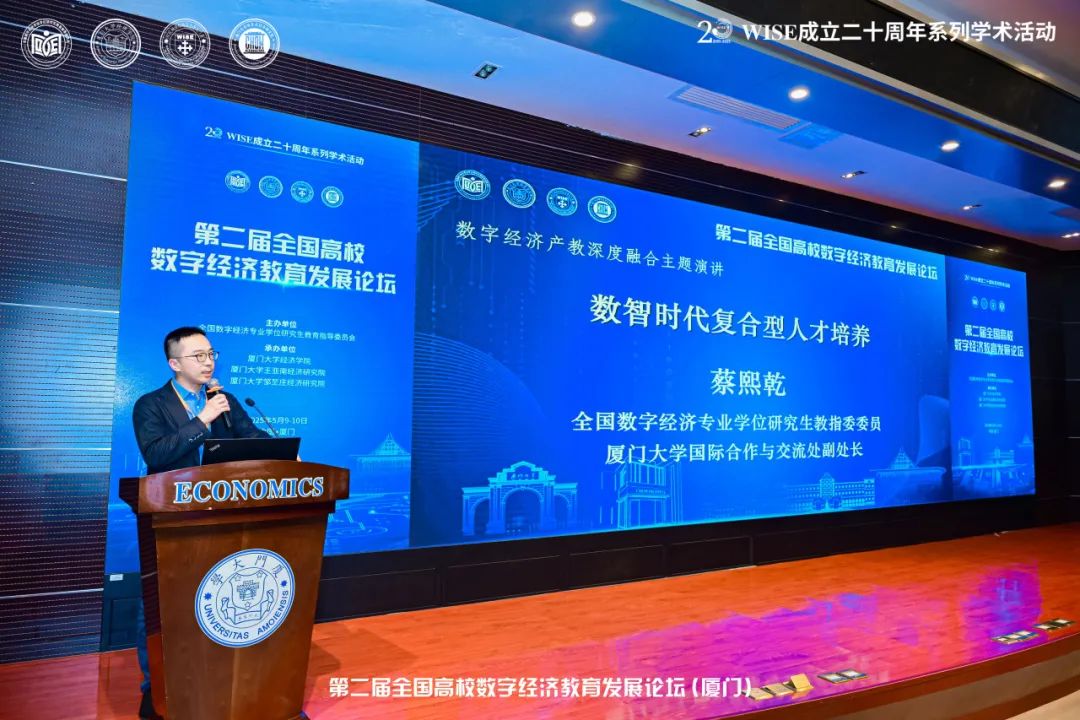


Mr. Cai Xiqian, member of the National Digital Economy Teaching Guideline Committee and Deputy Director of the International Cooperation and Exchange Department of Xiamen University, shared a report titled "Cultivation of Comprehensive Talents in the Age of Digital Intelligence". He mentioned that the digital economy is a national strategic demand, and universities should actively respond to social changes and lead the future development in talent training to serve the national strategy and industrial development. In view of the problem of matching the talent cultivation process of universities with the rapidly iterating social demand, he proposed to promote reforms from optimizing the education system, deepening university-enterprise cooperation, and perfecting the feedback mechanism. He introduced Xiamen University's practical exploration of talent cultivation through AI empowerment and the promotion of interdisciplinary approaches.
Round-table forum






In the afternoon of the 10th, four roundtable forums were held simultaneously in the Economy Building, focusing respectively on the reshaping of the higher education paradigm by digital intelligence technology, the integration of industry and education to promote the cultivation of digital economy talents, the innovation of the cultivation mechanism of digital economy talents, and the creation of the characteristic cultivation of digital economy talents according to local conditions.
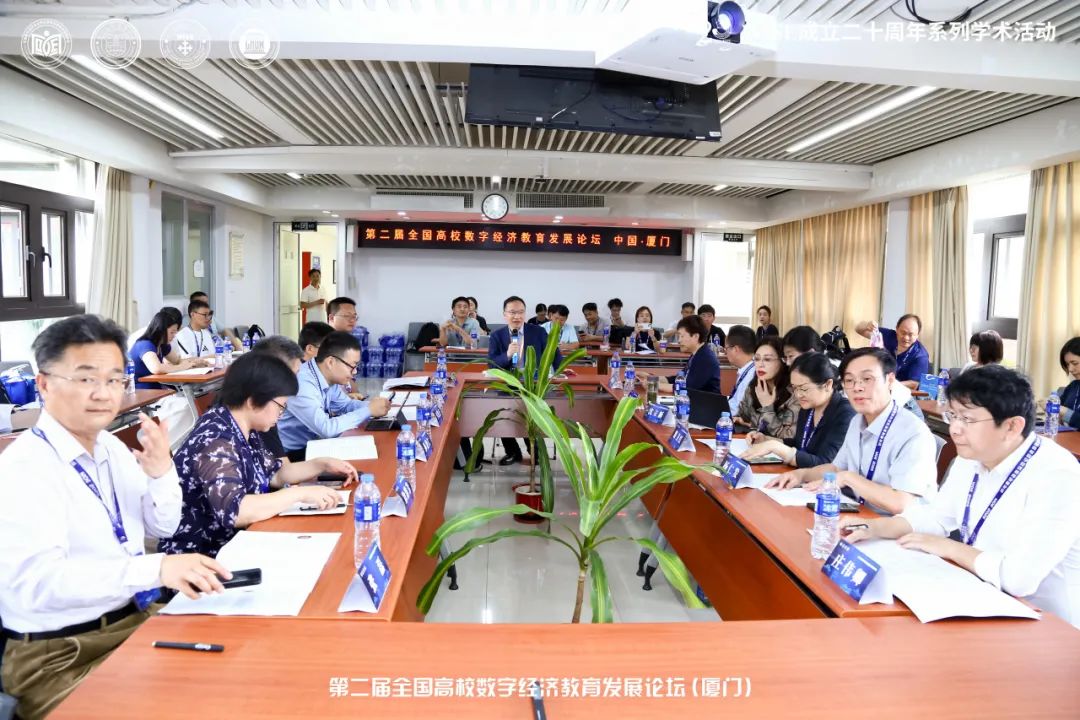


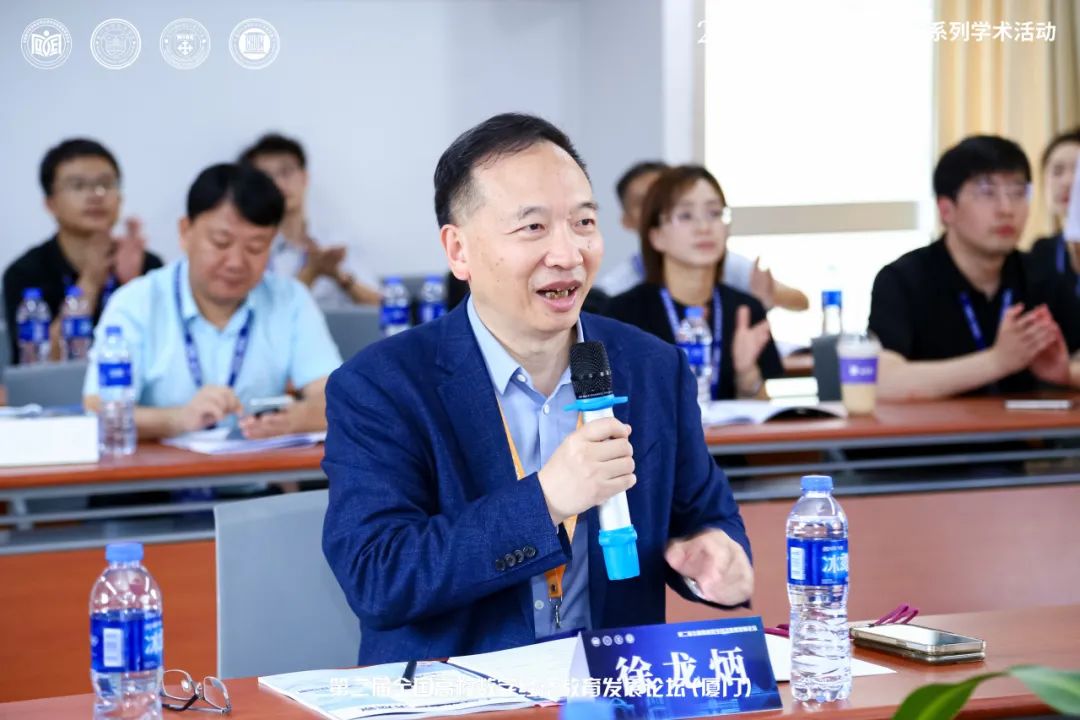


The forum "Digital Intelligence Technology Reshaping Higher Education Paradigm" was moderated by Xu Longbing, a member of the National Digital Economy Teaching Guideline Committee and Executive Director of the Institute of Chinese Modernization, Shanghai University of Finance and Economics. Mr. Cao Erbao, Vice Dean of the School of Economics and Trade of Hunan University, Mr. Cheng Xinxuan, Dean of the School of Economics of Hebei University, Mr. Dong Zhiqiang, Vice Dean of the School of Economics and Management of South China Normal University, Mr. Huang Dunping, Vice Dean of the School of Economics of Anhui University of Finance and Economics, Mr. Li Kaijie, Dean of the School of Economics of Henan University of Finance and Economics and Law, Mr. Shen Lixin, Vice Dean of the School of Shipping Economics and Management of Dalian Maritime University, Mr. Sun Churen, Dean of the School of Economics and Trade of Guangdong University of Foreign Studies. Xie Weihong, Dean of the School of Economics, Guangdong University of Technology; Xu Qunfang, Dean of the Department of Economics and Director of the Institute of Industrial Economics, School of Business, Ningbo University; Yang Renfa, Vice Dean of the School of Economics, Anhui University; Zhang Lei, Director of the Center for Professional Degree Education, School of Social Sciences, Tsinghua University; and Zhuang Weijing, Secretary of the Party Committee of the School of Internet Economics and Trade, Fujian University of Technology, etc., shared their views in the meeting.
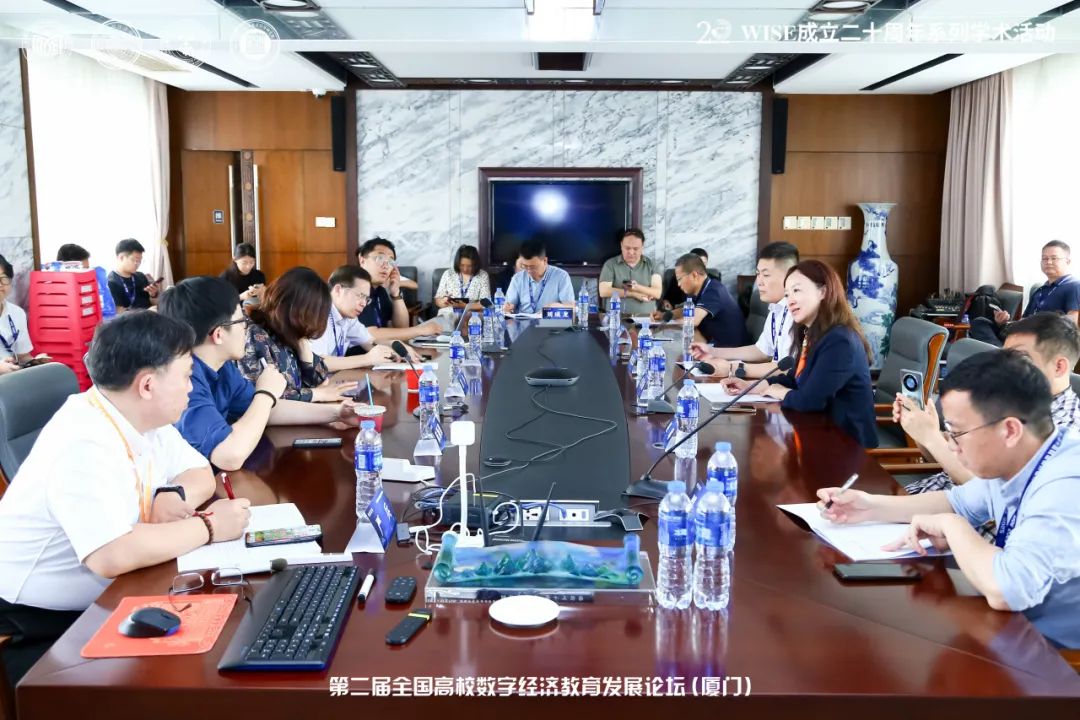


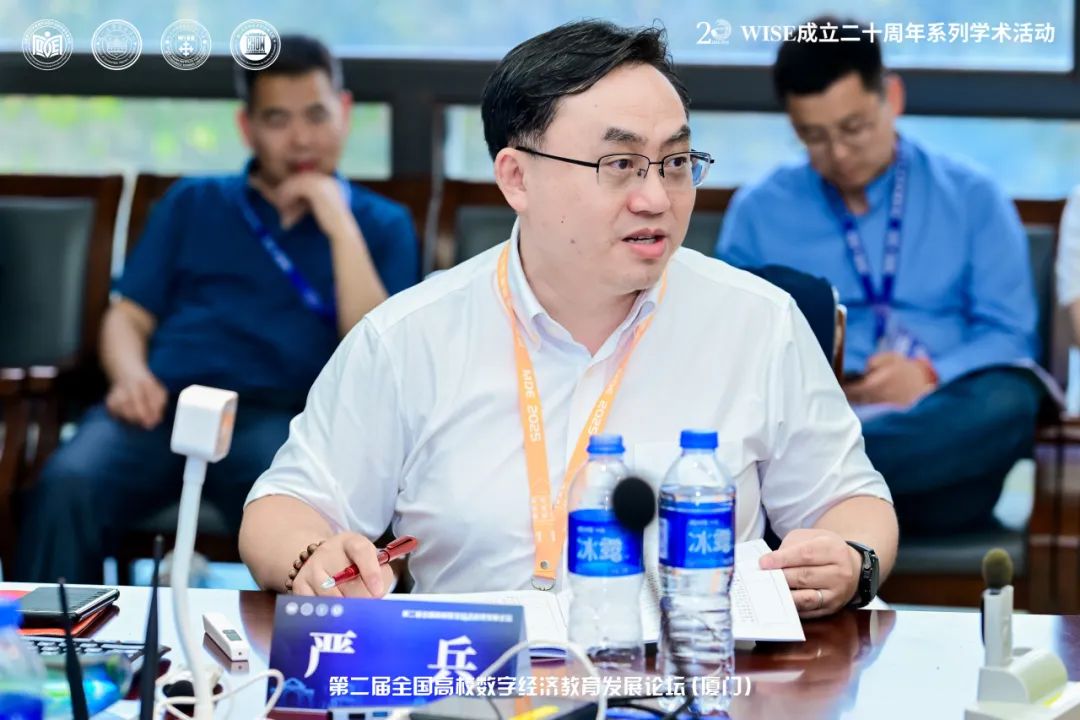


Cheng Hua, Professor He Shuquan from the School of Economics of Shanghai University, Jin Weibo from the School of Business of Qingdao University of Technology, Liu Chenglong from the School of Economics of Inner Mongolia University of Finance and Economics, Xiujun from the School of Economics and Management of Shanxi Normal University, Tao Feng from the Institute of Industrial Economics of Jinan University, Qi Xingxiang from the School of Economics of Shandong University of Finance and Economics, Zhang Hongmei from the School of Economics of Jilin University of Finance and Economics, and Chen Xiaobing, the Director of the Department of Digital Technology at the School of Digital Economy of Shanghai University of Finance and Economics Chen Yuan, Director of Digital Intelligence Technology Teaching and Research Department, and Zhou Qiang, Director of Digital Economy Department, School of Economics, Zhongnan University of Economics and Law, shared their views at the meeting.
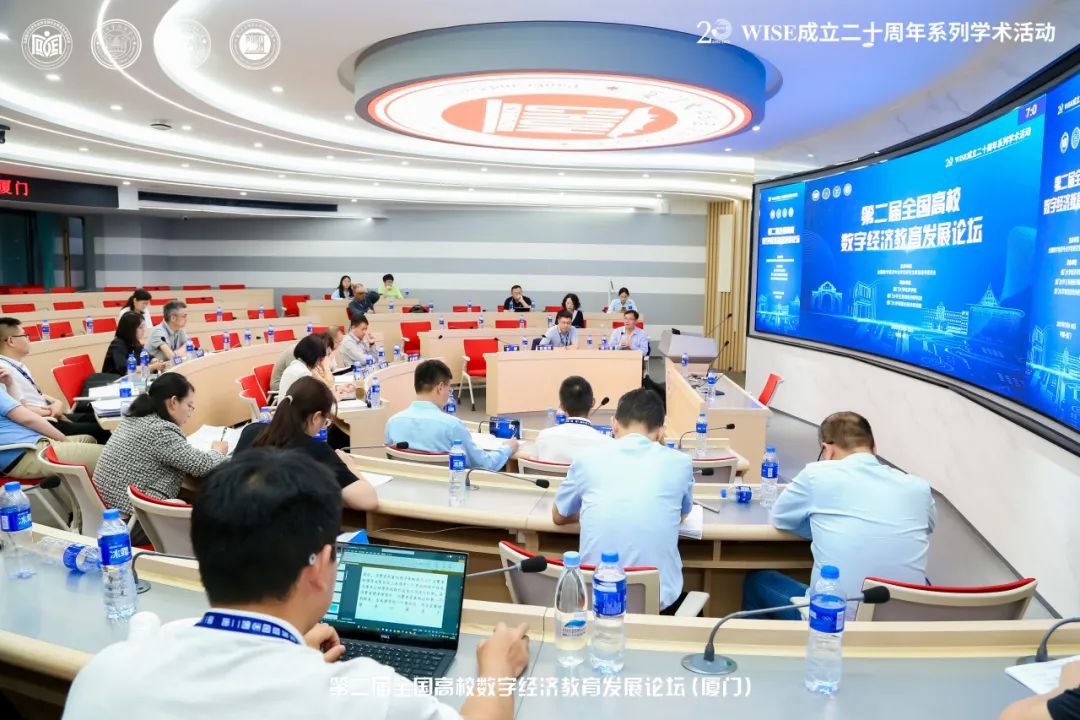


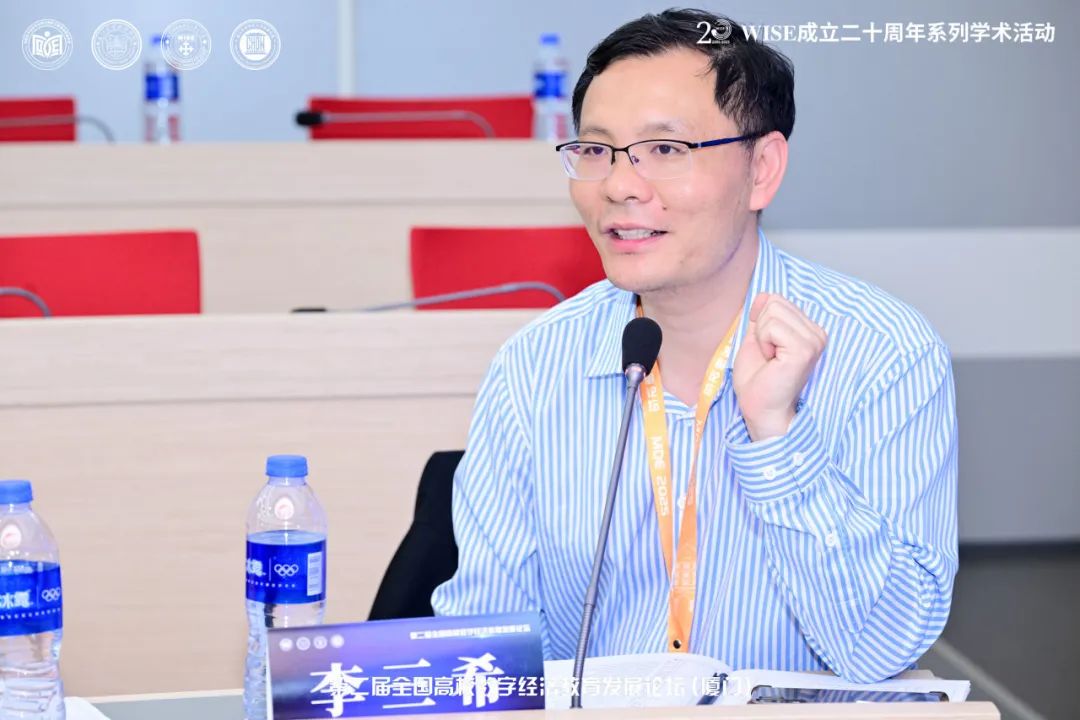


The forum on "Innovation of Digital Economy Talent Cultivation Mechanism" was hosted by Li Sanxi, Vice Dean of School of Economics, Renmin University of China. Song Ying, Dean of the School of Economics of Chongqing Business University, Wang Ling, Vice Dean of the School of Economics of Zhejiang University of Finance and Economics, Wang Xianbin, Dean of the Department of Economics and Academic Director of the Digital Economy Program of the School of Economics of Jinan University, Wu Yingjun, Director of the Department of Digital Economy of the School of Economics of Southwestern University of Finance and Economics, and Zhang Hongyan, Director of the Graduate Student Office of the School of Economics of Nankai University.
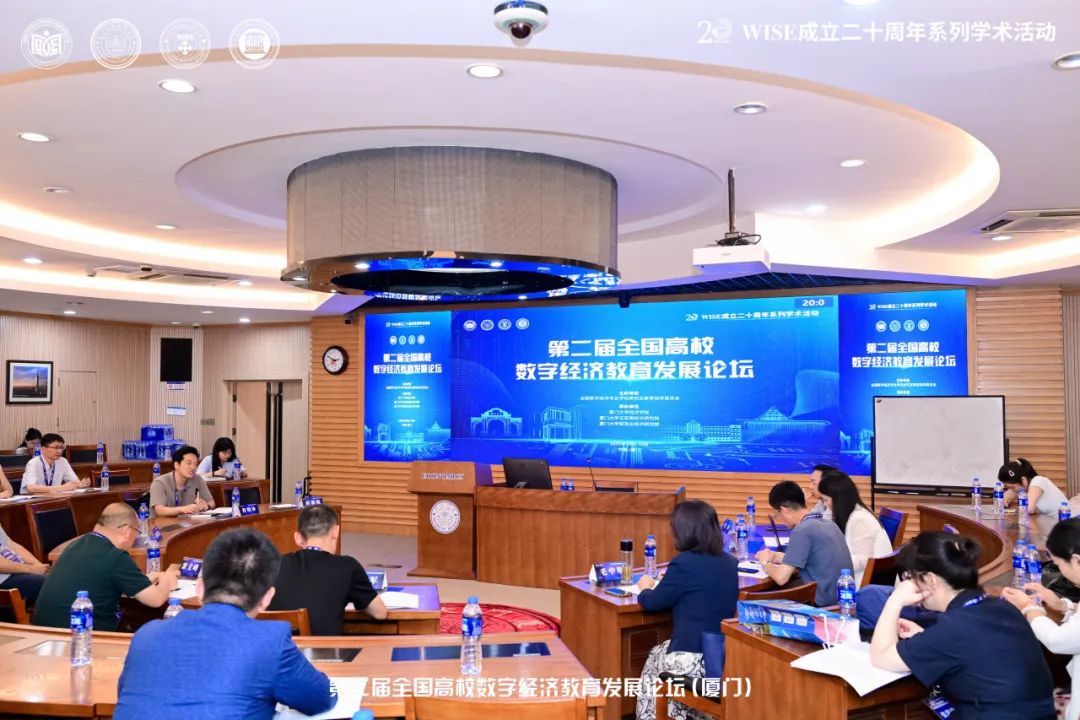


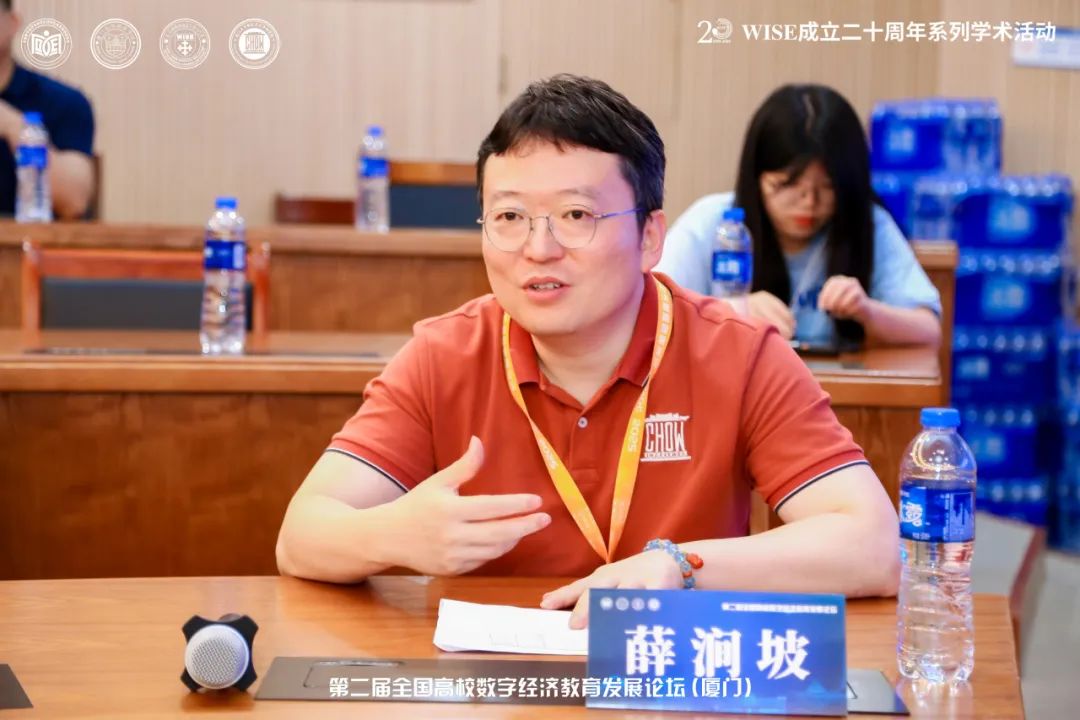


The forum on "Specialized Training of Digital Economy Talents according to Local Conditions" was hosted by Xue Jianpo, Vice President of Zou Zhizhuang Economic Research Institute of Xiamen University. Cheng Xiaolin, vice dean of the School of Economics and Trade of Henan University of Technology; Du Qunyang, executive dean of the School of Economics of Zhejiang University of Technology; Han Zhaoliang, director of the Digital Economy and Business Intelligence Laboratory and vice dean of the School of Economics of Harbin University of Commerce; Kang Wenfeng, vice dean of the School of Economics and Management of Guizhou Normal University; Liu Jun, vice dean of the School of International Trade of Shanxi University of Economics and Business; Mao Zhongming, vice dean of the School of Economics of Central and South China University for Nationalities; Shu Changjiang, vice dean of the School of Economics and Management of Nanchang University of Shu Changjiang, vice dean of the School of Economics and Management of Nanchang University, Wang Weiwei, assistant dean of the School of Economics of the University of Chinese Academy of Social Sciences, and Yu Qian, vice dean of the School of Economics of Wuhan University of Science and Technology, shared their views on the theme at the meeting.
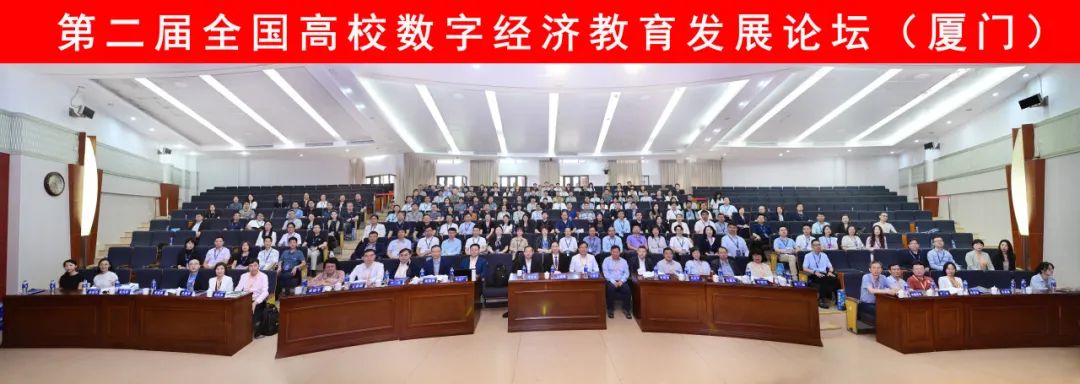


The 2nd National Forum on Digital Economy Education Development in Colleges and Universities came to a successful conclusion with warm exchanges and discussions in each roundtable forum. The National Steering Committee of Graduate Education for Digital Economy Degree aims to promote the universities to deepen the reform of the training mechanism of digital economy master degree, build the education system of industry-teaching integration and collaborative innovation, comprehensively improve the quality of high-level applied talents training in the field of digital economy, and provide strong talents support for the construction of digital China and Chinese-style modernization through the idea collision and experience sharing of this forum.
If there is any infringement, please contact us for removal!
Company Profile
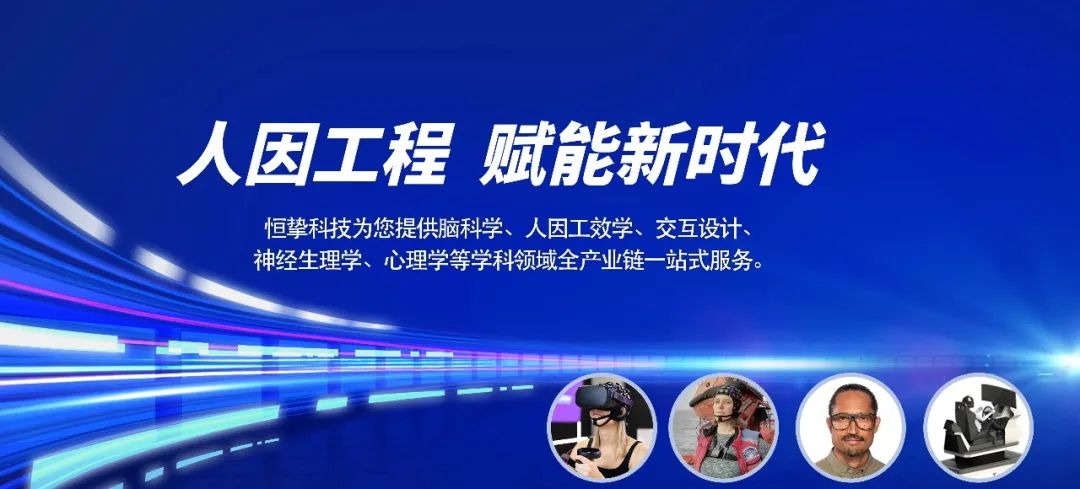


Ltd. is an innovative high-tech enterprise focusing on cutting-edge technology, specializing in brain science, neural management, human factors engineering, biomechanics, anthropomorphic environments and XR simulation reality and other multidisciplinary cross-cutting fields. The company is invested by Zhongke (Guangdong) Science Group, relying on the scientific research strength of Guangdong Human Factors Technology Research Institute and Wuhan Human Factors Engineering Technology Research Institute, and has constructed a professional operation system integrating research and development, production, sales and technical service to provide customers with one-stop, high-quality scientific and technological solutions.
With excellent innovation ability, Hengbest Technology has been awarded many invention patents, software copyrights and registered trademarks, selected in many authoritative lists such as National High-tech Enterprises, and participated in the compilation of national standards and group standards. The company has been serving universities and research institutes for a long time, and has cooperated deeply with many national societies such as the Chinese Society of Ergonomics, the Chinese Psychological Society, the Architectural Society of China, etc. The company organizes and participates in more than 40 academic conferences every year to promote technical exchanges and the development of the industry.
With the concept of "Technology Empowerment, Innovation Drive", Hengzhi Technology is committed to become a leading technology enterprise in the industry, to help national scientific and technological progress and social development, and to work together with partners from all walks of life to achieve a better future of technological empowerment.
